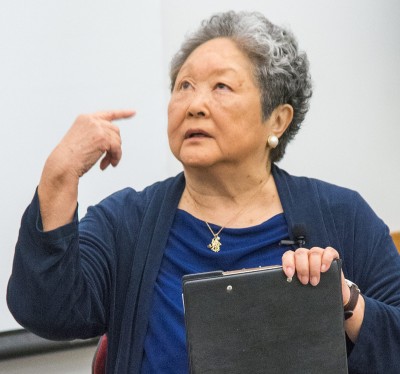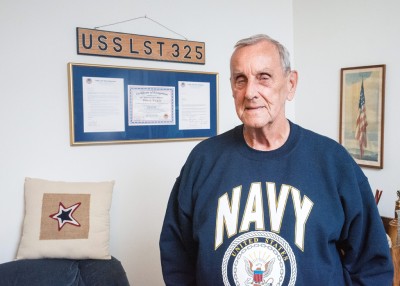David Steinfels
By Paul Wood

Photo By Rick Danzl/The News-Gazette
URBANA — In four years assigned to a helicopter unit, Cpl. David Steinfels experienced a lot of hard landings, fast-roping off the “helos” with up to 100 pounds of gear when it wasn’t safe enough to come down.
He served in the Marine Corps infantry from 2011 to 2015, and received advanced medical and leadership training.
Steinfels served in Asia, Africa and the Middle East.
At the Chez Center for Wounded Veterans, where he lives while studying at the University of Illinois, there’s a map where the veterans place a pin for every place they served, and Steinfels has put up several of them.
“We ran out of pins,” he says.
Now 25, Steinfels grew up in the Chicago suburb of Park Ridge, and at the age of 17, he enlisted in the Marine Corps infantry, with his Marine brother helping in the decision process.
He has four brothers who are also Marines.
Boot camp is never easy, but the Marines put their own spin on it.
“It takes a lot of mental and physical endurance, but it’s great for team-building,” Steinfels says.
His extensive training at infantry school at California’s Camp Pendleton included advanced weapons and tactics training and some medical classes, and he currently co-teaches the subject for UI ROTC cadets.
“This led me to apply my leadership training to several organizational and self-produced projects, which allowed me to coordinate and complete missions,” he says.
Trained in helicopter insertion, Steinfels briefly served in a “show of force” in Korea, but had two major deployments.
In the first, he was sent to Japan, Australia — and the Philippines during an insurgency.
He trained soldiers from these countries.
The second deployment to the Persian Gulf included being a quick reaction force to Yemen, where Shia-led Houthis “were expected to take a large assault on the U.S. embassy.”
(The Houthis’ slogan is “God is great, death to the U.S., death to Israel, curse the Jews and victory for Islam.”)
He was also stationed in Djibouti, working with the French Foreign Legion “in and out of combat zones” over the two deployments.
Along with CH-46s and CH-53 Super Stallions, Marines flew in expensive V-22 Ospreys — with both vertical takeoff and landing and short takeoff and landing capabilities, but also some problems before breaking in their early years.
Eventually, the fast-roping off Ospreys took a toll on Steinfels.
Several times, he “crunched my ankles” on landing.
But conditions grew worse.
The repeated injuries resulted in fracture and compression of his spine. He’s still looking at his medical options.
Meanwhile, after community college, he’s working on a bachelor’s degree in global studies, with a minor in Mandarin Chinese.
Steinfels first studied Mandarin in high school.
“In the future, I hope to work in international business, particularly in the East Asian markets,” he says.
He sees China as looming large in both business and politics.
Do you know a veteran who could share a story about military service? Contact Paul Wood at pwood@news-gazette.com.
Read more stories from local veterans:
 Melvin Parker
CHAMPAIGN — Melvin Parker joined the Army right after World War II, when it looked like there might be war with the Sovi …
Melvin Parker
CHAMPAIGN — Melvin Parker joined the Army right after World War II, when it looked like there might be war with the Sovi …
 Yuki Llewellyn
Yuki Llewellyn knows what it’s like to grow up in an interment camp. But she wasn’t held by the Germans or the Japanese. …
Yuki Llewellyn
Yuki Llewellyn knows what it’s like to grow up in an interment camp. But she wasn’t held by the Germans or the Japanese. …
 Bruce Voges
ST. JOSEPH — Bruce Voges enlisted in the Navy in 1944 at the age of 17, landed Marines from a small craft on Iwo Jima an …
Bruce Voges
ST. JOSEPH — Bruce Voges enlisted in the Navy in 1944 at the age of 17, landed Marines from a small craft on Iwo Jima an …